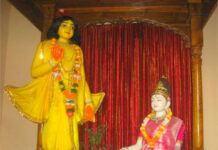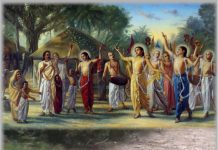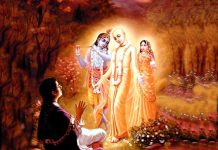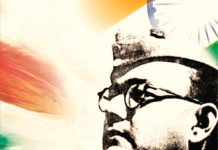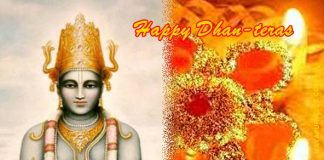Popularly known as a Hindu scripture, Srimad Bhagavatam, also known as Bhagavat Purana, is actually a post graduation study in the subject matter of self realization for every human being regardless of his or her faith or religion. The mystery of Srimad Bhagavatam deepens as it includes the science of creation of the universe, manifestations of different material elements, how the Supreme Soul enters the universe and activates it, how He maintains it and how He not only destroys it but also regenerates it through His multifarious energies and agencies.
Srimad Bhagavatam talks about the dimension of the universe, the fourteen planetary system along with the names of the rulers and their lifespan, and the names, time period, descriptions, and activities of the incarnations of the Lord. It is no surprise that with its 18000 well-composed verses and the mind-blowing yet purely scientific knowledge that it delivers, Srimad Bhagavatam is often considered a mythological text by the less intelligent class of people claiming to be scholars.
Fortunately, with emerging technologies and progressing modern science, the concept of the universe and the core principles of physics that we know of have seen significant changes. Scientists have begun to wonder if the universe was indeed created with intelligence, as opposed to the struggling big-bang theory, and whether interplanetary communication and space travel indeed existed in previous ages as described in Srimad Bhagavatam and other Vedic scriptures.
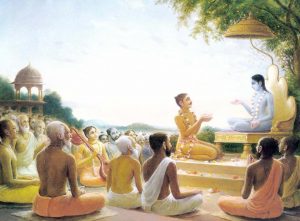
The mystery of Srimad Bhagavatam is not limited just to the so-called atheists and rationalists; it also bewilders believers, religionists, and even spiritualists. However, this is true only so far the seeker of truth does not hear it from the acharyas, the spiritual masters who come in the line of disciplic succession, or guru parampara.
One well-debated mystery of Srimad Bhagavatam is about whether God is a person. Srila Prabhupada says the following right in the beginning of his introduction to the first chapter of Srimad Bhagavatam, titled Creation:
“The conception of God and the conception of Absolute Truth are not on the same level. The Srimad-Bhagavatam hits on the target of the Absolute Truth. The conception of God indicates the controller, whereas the conception of the Absolute Truth indicates the summum bonum or the ultimate source of all energies. There is no difference of opinion about the personal feature of God as the controller because a controller cannot be impersonal. Of course modern government, especially democratic government, is impersonal to some extent, but ultimately the chief executive head is a person, and the impersonal feature of government is subordinate to the personal feature. So without a doubt whenever we refer to control over others we must admit the existence of a personal feature.” (S.B. Introduction to Canto 1)
Another mystery of Srimad Bhagavatam is, if Krishna is the incarnation of Vishnu as most people believe, why is He described as Bhagavan svayam, meaning the original personality of Godhead? Also, if Lord Krishna was not the original Vishnu, why did Srila Vyasa deva dedicate more than a full Canto, or skandha, exclusively to Lord Krishna in Srimad Bhagavatam when all other incarnations are described in only one or more chapters? One reason other incarnations are described in the book is to show how they are all incarnations of Lord Krishna.
ete chamsa-kalaah pumsah kṛishnas tu bhagavan svayam
indrari-vyakulam lokam mridayanti yuge yuge
TRANSLATION: All of the above-mentioned incarnations are either plenary portions or portions of the plenary portions of the Lord, but Lord Sri Krishna is the original Personality of Godhead. All of them appear on planets whenever there is a disturbance created by the atheists. The Lord incarnates to protect the theists.
Besides, the fact that many other puranas also declare Krishna as the source of all Vishnu incarnations adds to this mystery. Who is whose incarnation? Vishnu is Krishna’s or Krishna is Vishnu’s? To find it out you may want to read Is Krishna an expansion of Vishnu or is it the other way around?
One more mystery of Srimad Bhagavatam is its name itself. If Bhagavatam was only about the pastimes of Lord Krishna, why did Vyasa deva name it Srimad Bhagavatam or Srimad Bhagavat, and not Krishna purana, Govind purana, etc? The word Bhagavat synonymizes with Bhagavan, or the Supreme Personality of Godhead. There are many more mysteries but almost all of them are answered in Srimad Bhagavatam.
However, there is one mystery of Srimad Bhagavatam that the readers hardly notice. The fact that they hardly notice it is in itself is another mystery, but the real biggest mystery is Srimati Radha, or Radharani.
Practically, the whole world worships Lord Krishna along with Radharani. There are millions of images showing the divine couple. When there are lectures on Srimad Bhagavatam, widely known as Bhagavata saptah, especially by professional reciters , all they talk about is Radha and Krishna. There are thousands of songs written to glorify the pure love between Radha and Krishna. In fact, especially in India, there could be hardly any person who knows Krishna and does not know Radha. Despite all these and despite the fact that Srimad Bhagavatam especially is about the glories of Lord Krishna, not even once there directly appears, in the entire book, the most auspicious name of Srimati Radha!
Why?
Thanks to the previous acharyas, the most confidential eternal associates of Lord Krishna, the answer to this particular mystery of Srimad Bhagavatam is available to us.
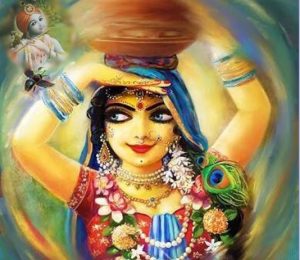
The main speaker of Srimad Bhagavatam is Shukadeva Gosvami, the son of Vyasa dev. Shukadeva Gosvami is a parama-hamsa, maha-bhagavat devotee of the Lord. His intense love for Sri Sri Radha-Krishna is simply inconceivable. It is said that he is incarnation of Srimati Radharani’s favorite parrot in Goloka Vrindavan known as Lila Shuka, who sings the sweet glories of Sri Krishna to Srimati Radha for Her pleasure, especially when She feels intense separation from Her beloved, Krishna.
There is also a story how when Lord Shiva, in Kailash, was narrating Srimad Bhagavatam to his dear wife Parvati devi, at one point she fell asleep but whenever Lord Shiva asked if she was listening, he would get a “yes” in reply. Later on Lord Shiva realized that the “yes” was coming from a parrot sitting on a nearby tree, who was attentively listening to Lord Shiva’s narration, not from Parvati devi. This made Lord Shiva angry. He chased the parrot who fled in fear and took shelter of Vyasa dev’s ashram in Badrinath. In order to hide, the parrot entered the mouth of Vatika, the wife of Vyasa dev, and after remaining for 16 years in her stomach, he took birth as Shukadeva. There are other stories as well regarding the identity of Shukadev Gosvami and varying opinions too but the central point is, he was a highly elevated, spontaneous devotee of Lord Krishna from the very birth.
It is explained that when Shukvadeva Gosvami was speaking Srimad Bhagavatam to King Parikshit, the king had only seven days to live. Shukadeva knew well that if he spoke of Srimati Radha, even uttered Her name once, he would go into trance, samadhi, for months remembering his eternal loving service to Srimati Radhika and wouldn’t be able to complete the narration. For this reason he didn’t speak about Radha directly although he did mention the words “aradhana”, aradhitah, and “gopi” indicating Her name.
anayaradhito nunaṁ bhagavan harir isvaraḥ
yan no vihaya govindaḥ prito yam anayad rahah
TRANSLATION: Certainly this particular gopi has perfectly worshiped the all-powerful Personality of Godhead, Govinda, since He was so pleased with Her that He abandoned the rest of us and brought Her to a secluded place. (S.B. 10.30.28)
Srila Visvanath Chakravarti Thakur explains that the word aradhitah refers to Srimati Radha. He comments, “The sage Shukadeva Gosvamī has tried with all endeavors to keep Her name hidden, but now it automatically shines forth from the moon of his mouth. That he has spoken Her name is indeed Her mercy, and thus the word aradhitah is like the rumbling of a kettledrum sounded to announce Her great good fortune.”
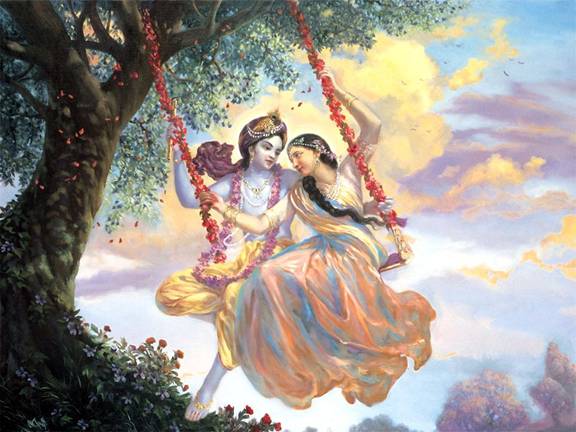
This mystery of Srimad Bhagavatam can be appreciated only by the devotees of Sri Sri Radha-Krishna. For others it remains just a theory with no real substance. In fact, Radharani Herself has remained a great mystery to mundane scholars since centuries.
Loved, directly or indirectly, by one and all, moving and non-moving beings, Srimati Radharani, more commonly known as Radha, Radhika, Radhe and many other names, the eternal consort of Sri Krishna, has remained a mystery since millenniums. Some say She was the most beautiful gopi in Vrindavan among other gopis, who loved Krishna more than their very own selves. Others say She was an incarnation of Lakshmi devi, the eternal consort of Lord Vishnu. People also curiously discuss whether She was older than Krishna or younger, whether She was married to Krishna or not, and so on. Radha is not what most people think, an ordinary village girl who fell in love with Krishna, or a mythological beauty, or, even worse, an imaginary icon of love…One cannot understand Srimati Radha or Her relationship with Sri Krishna unless and until one’s heart is completely purified of lusty desires…(http://mayapurvoice.com/svagatam/knowing-more-about-srimati-radha-on-radhastami-day-2/)
Srimati Radharani is Lord Krishna’s pleasure potency, or ahladini shakti. What this means is She cannot be separated from Krishna because energy cannot be separated from the energetic. Her another name is Madana-mohana-mohini because She attracts Krishna, who is known as Madana-mohana. The mystery of Srimad Bhagavatam remains a mystery to those who do not learn from Vaishnava acharyas like the Gosvamis of Vrindavan, who appeared when Lord Chaitanya descended to freely distribute the transcendental love of Lord Krishna.
Srila Prabhupada says: “To perform devotional service means to follow in the footsteps of Radharani, and the devotees in Vrndavana put themselves under the care of Radharani in order to achieve perfection in their devotional service. In other words, devotional service is not an activity of the material world; it is directly under the control of Radharani. In Bhagavad Gita it is confirmed that the mahatmas or great souls, are under the protection of daivi prakrti, the internal energy—Radharani. So, being directly under the control of the internal potency of Krishna, devotional service attracts even Krishna Himself.” (NOD pg. 16).
Jay Sri Radhe! Jay Sri Krishna! Hare Krishna!


